NOTE: My 2020 State Capitol Report newsletter has been mailed out to folks who live in Assembly District 71!
You can also read it HERE or by clicking on the image below:
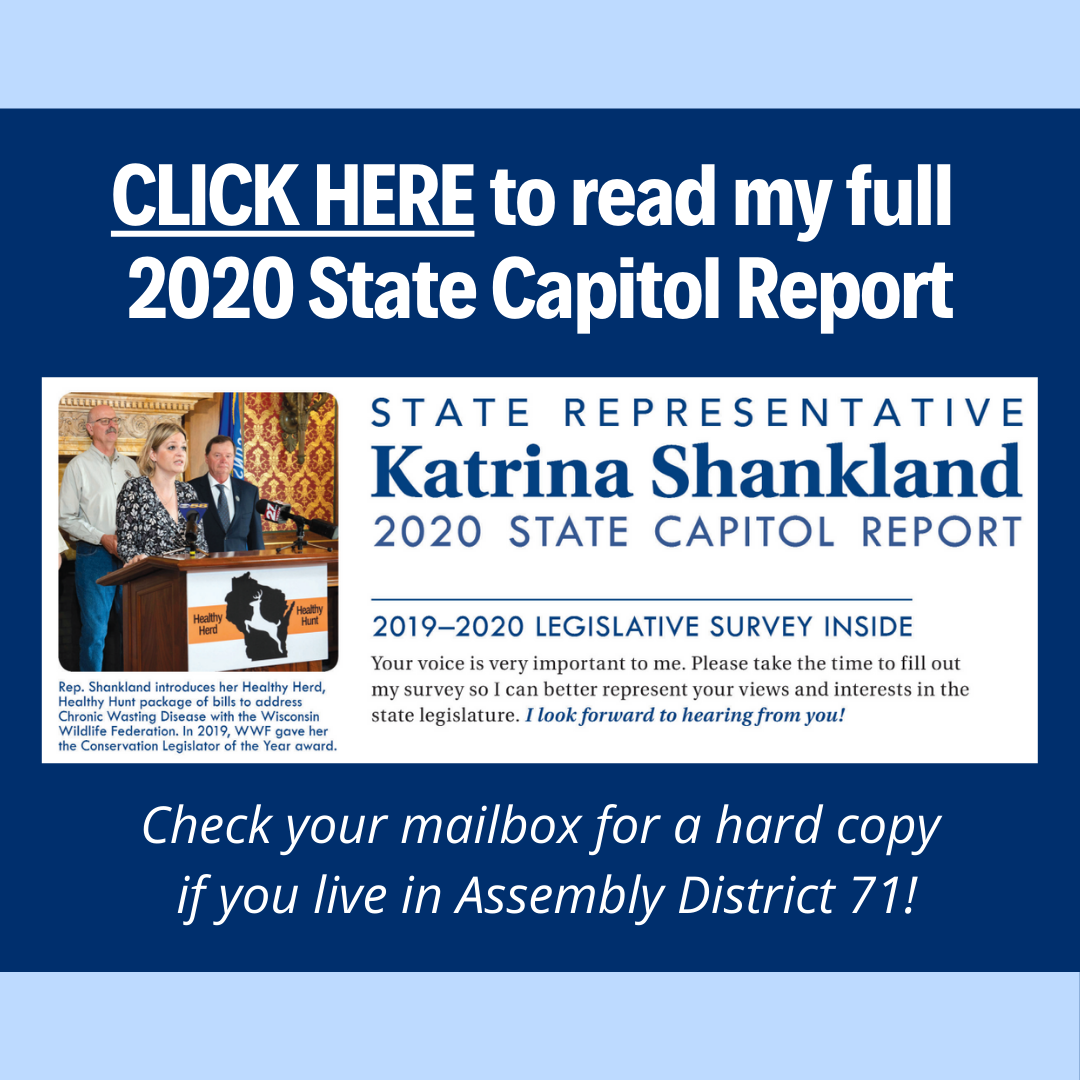
Flood & Natural Disaster Preparedness
Over the past few years, we have seen significant levels of precipitation and increased flooding throughout Central Wisconsin. At the request of Governor Evers, legislators introduced a package of bills to increase support for communities dealing with flooding complications across the state. I am happy to be a cosponsor of all of these bills to address and mitigate the widespread effects of flooding.
The package includes: an income tax deduction for flood insurance premiums, disaster assistance payments, the creation of a flood mitigation program in the Department of Transportation, funding for the municipal flood control grant program, and funding for highways damaged by flooding disasters.
As we head into peak flooding season, I encourage you to look into the benefits of flood insurance so you can ensure you have the financial protection you may need. Just one inch of water in a home can cause thousands of dollars in damage. Homeowners in Wisconsin can buy a flood insurance policy through either the NFIP, a federal program enabling property owners in participating communities to purchase insurance protection against losses from flooding, or through a private carrier. You can contact your local insurance agent or visit www.floodsmart.gov for more information about these opportunities.
Additionally, FEMA has extended the grace period for flood insurance renewal premiums from 30 days to 120 days for NFIP flood insurance policies with an expiration date between February 14- June 15, 2020. You can read more HERE.
Promise Made, Promise Kept:
AB 310 Signed Into Law
When Portage County was pursuing a referendum for the Portage County Health Care Center, I worked closely with Portage County Board supervisors and the Department of Revenue to help navigate our statutes, and found that they created unnecessary hurdles that made the process inefficient and cumbersome.
Building on what I learned through that effort, I worked with the Counties Association, Towns Association, League of Municipalities, and county clerks to draft a bill that would solve the issue while incentivizing general elections instead of high-cost, low-turnout special elections. Then I worked with colleagues across the aisle to introduce AB 310 and pass it, and now Governor Evers has signed the bill into law as 2019 Wisconsin Act 126!
You can read a detailed description of the changes made by the bill HERE.
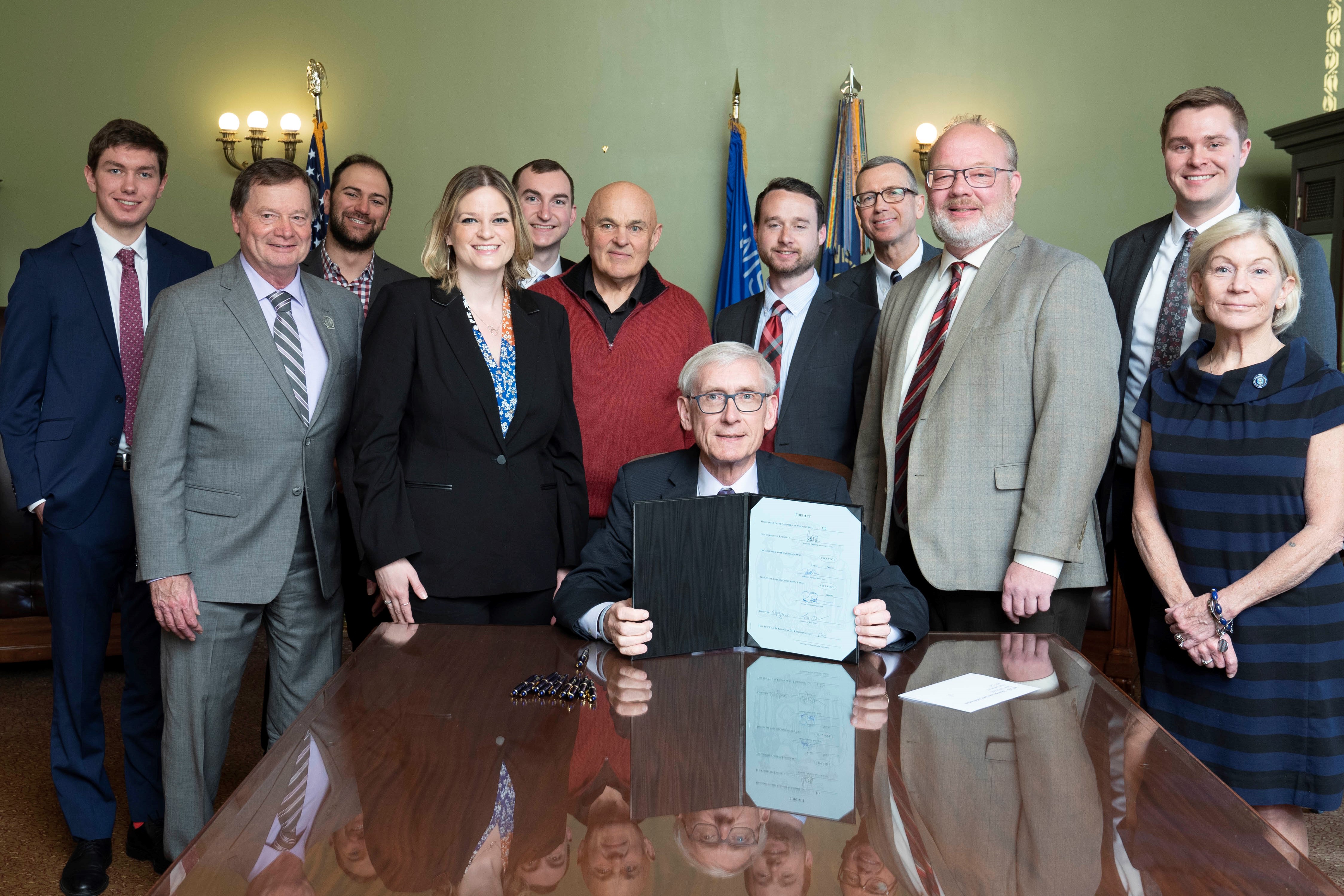
Photo (above): Governor signs AB 310 into law as 2019 Wisconsin Act 126
Because of the lessons we learned in Portage County, other towns, villages, cities, and counties will have a more clear and efficient process to follow when pursuing a referendum in the future. We will also save taxpayer money on low-turnout special elections by ensuring these referenda will happen during already-scheduled general elections. This is exactly the work we should be doing in government — identifying problems, proposing solutions, and working hard to get results.
Supporting UW-Stevens Point Students, Faculty, and Staff
This week, you may have seen a news report about UW System's projected $170 million deficit due to COVID-19. This includes a projected $5 million deficit at UW-Stevens Point. As the ranking member of the Assembly Committee on Colleges and Universities, I have been in frequent contact with UW System leadership.
Yesterday, I released a statement calling on my legislative colleagues to work together to keep our higher education institutions afloat during this difficult time. Without legislative action, I am worried about the long-term sustainability of our campuses, especially our more rural ones. Everyone deserves access to higher education, and for every one dollar we spend on the UW System, we receive $23 in return.
Wisconsin Paper Caucus Meeting in Appleton with DOT Secretary Thompson
In early March, members of the legislative Paper Caucus came together in Appleton at Boldt Construction Co. for a meeting with industry partners. As Assembly Vice Chair of the Paper Caucus, I was pleased to invite and welcome DOT Secretary Craig Thompson to present to the group!
The Wisconsin Paper Caucus is an informal body comprised of legislators from both houses, a representative from Governor Evers' administration, and various stakeholders from throughout the state, coming together to work on commonsense policy solutions to sustain and promote forestry and papermaking manufacturing sectors throughout the state.
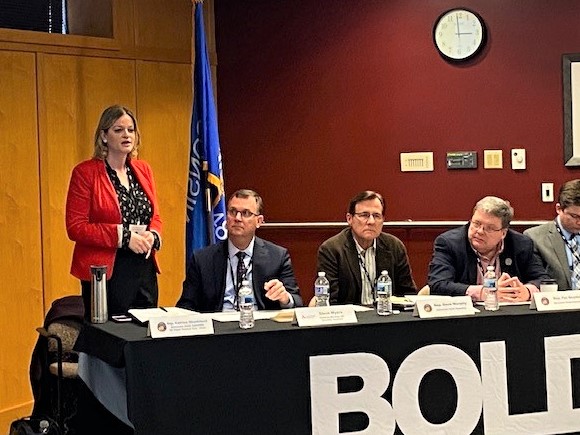 Photo (above): Rep. Shankland addresses attendees at the WI Paper Caucus meeting in Appleton Photo (above): Rep. Shankland addresses attendees at the WI Paper Caucus meeting in Appleton
Better Broadband Legislation
I was glad to introduce the “Better Broadband” legislative package with some of my Democratic colleagues to invest in rural broadband. I introduced legislation to invest $100 million in state broadband expansion and improve mapping accuracy in order to help the Public Service Commission best allocate broadband expansion grant applications (AB 959/ SB 839). I also introduced legislation to prioritize farms when expanding fiber optic broadband lines using state broadband grants (AB 955/ SB 834).
It’s past time for rural broadband expansion to be taken seriously after years of lagging behind other states. I am proud to have introduced this legislation, which prioritizes rural communities and would be transformational for many Wisconsin families.
Biadasz Family Honored with Hometown Hero Award
In February, I was happy to welcome Bob and Diane Biadasz and their family to the State Capitol to receive a 2019-20 Hometown Hero Award. I nominated them because of their inspiring and continued efforts to support our farmers and their safety. The Assembly Hometown Heroes program recognizes individuals from around the state who make a difference in our communities and in the lives of those around them.
In 2016, the Biadasz family tragically lost their son, Mike, when he was agitating a manure pit and was overcome by the hydrogen sulfide gas. After their loss, the Biadasz family created the Mike Biadasz Farm Safety and Education Memorial Fund to ensure farmers are educated on the dangers of manure pit agitation and are trained in prevention strategies. They have hosted numerous safety workshops and fundraising events, raising tens of thousands of dollars to support farm safety and help farmers with rebates for gas monitors.
Because of their efforts, Mike’s legacy lives on with the farmers who have been touched by their outreach and education. Bob and Diane richly deserved the Hometown Hero award, the highest honor in the Assembly, and I thank them and their family for turning a truly heartbreaking loss into a tremendous opportunity to make a difference. Our community is grateful to their family for making a difference every day.
Photo (above): Bob and Diane Biadasz with members of their family and State Representative Katrina Shankland at the State Capitol after accepting the award
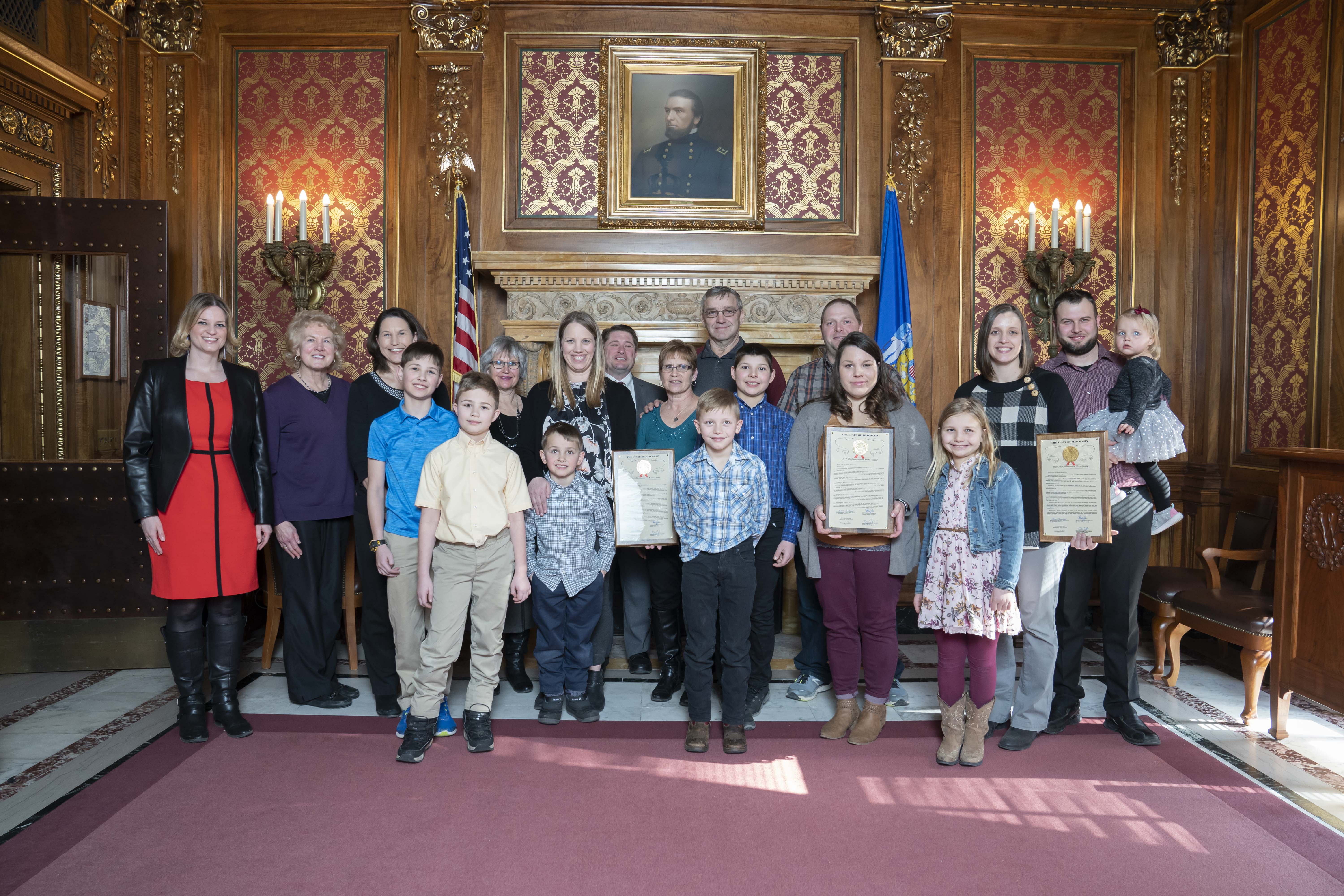
|
State Assembly Session Today on COVID-19 Relief
The Wisconsin State Assembly met today, Tuesday, April 14 to take up legislation related to the COVID-19 public health crisis. I voted for the bill, and it passed on a bipartisan vote of 97 to 2. The bill is a step in the right direction, but there is more work to be done. You can read my column about this legislation HERE.
The legislation will:
- Waive the one-week waiting period for unemployment insurance during a public health emergency
- Allow the budget committee to transfer up to $75 million from our current appropriations to address the public health emergency
- Use child care development funds from the federal government for child welfare services
- Allow households to apply for heating assistance under the low-income home energy assistance program any time before December 31, 2020
- Accept $580 million in federal funding for our state's BadgerCare program
- Eliminate co-pays and coinsurance for COVID-19 testing
- Prohibit any insurance provider or pharmacy benefit manager from discriminating based on a COVID-19 current, past, or suspected diagnosis
- Ensure people seeking out-of-network care will not pay more for a service that is not in the plan's network during a public health emergency
- Support local governments and homeowners by allowing them to waive any interest charges and penalties for a late installment payment on property taxes received on or before October 1
While I believe this legislation is a good start, I also would like to see funding and support for healthcare workers, families, and businesses struggling with the effects of the COVID-19 public health crisis. I also believe we should be addressing the coming election by strengthening vote by mail options.
That's why I helped introduce an amendment to fund small business grants, invest in childcare, prevent insurance companies from refusing to cover diagnostics and treatment for COVID-19, and support our UW System students and campuses. I also voted to support an amendment to fund vote by mail for every registered voter in Wisconsin.
I will continue calling for further action on the issues that matter most to the people of Wisconsin, including prioritizing our front line health care workers by providing more PPE, hazard pay, and protected sick leave.
Leading on Water Quality in WI
In the Legislature, my priority has always been our natural resources. Last year, I was especially excited that water was a top priority for both the legislature and Governor Tony Evers, who declared 2019 the “Year of Clean Drinking Water” and whose agencies have shown strong leadership on water quality issues.
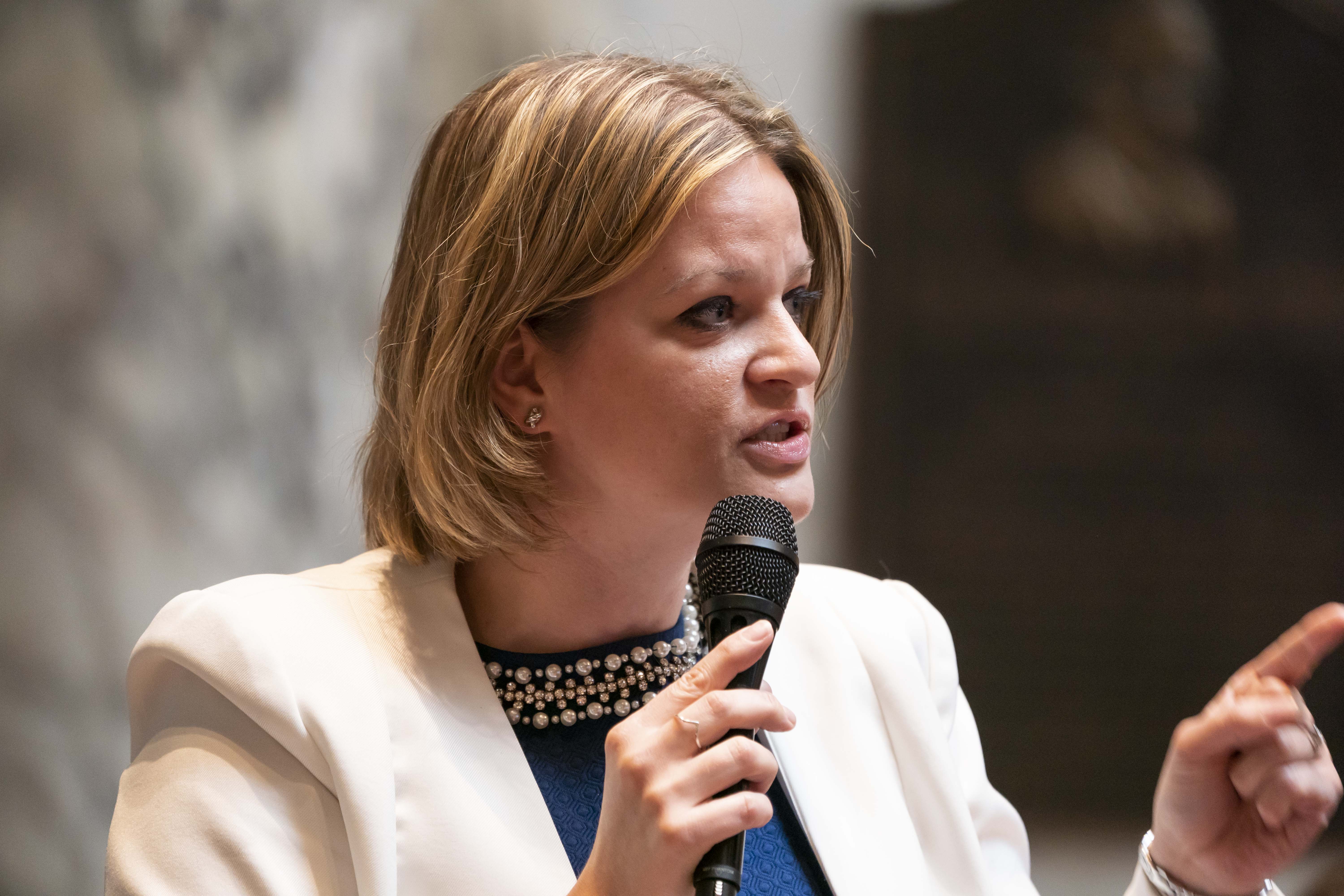 Photo (above): Rep. Shankland speaks on the Assembly floor Photo (above): Rep. Shankland speaks on the Assembly floor
I was honored to serve as Vice Chair of the bicameral, bipartisan Water Quality Task Force this session, and I am proud of the progress we made while reaching across the aisle to help address Wisconsin’s water quality challenges.
In 2019, we traveled over 2,000 miles throughout the state, held 14 public hearings, and heard over 100 hours of testimony from advocacy groups, farmers, conservationists, and concerned Wisconsinites. I was especially proud to host a public hearing in Stevens Point in July, including a tour of UWSP’s Water and Environmental Analysis Lab.
In early January of this year, we published our final report and introduced a package I helped negotiate and introduce, including ten bipartisan bills. These bills include, among others, increased investment in county conservation staff, support for conservation and water quality initiatives for farmers, important changes that increase access to the Well Compensation Grant program, funding for groundwater research at UW-Stevens Point’s Center for Watershed Science and Education, and an innovative nitrogen optimization pilot program to reduce nitrate contamination.
Photo (below): Rep. Shankland announces the introduction of the Water Quality Task Force's Report & Legislative Recommendations
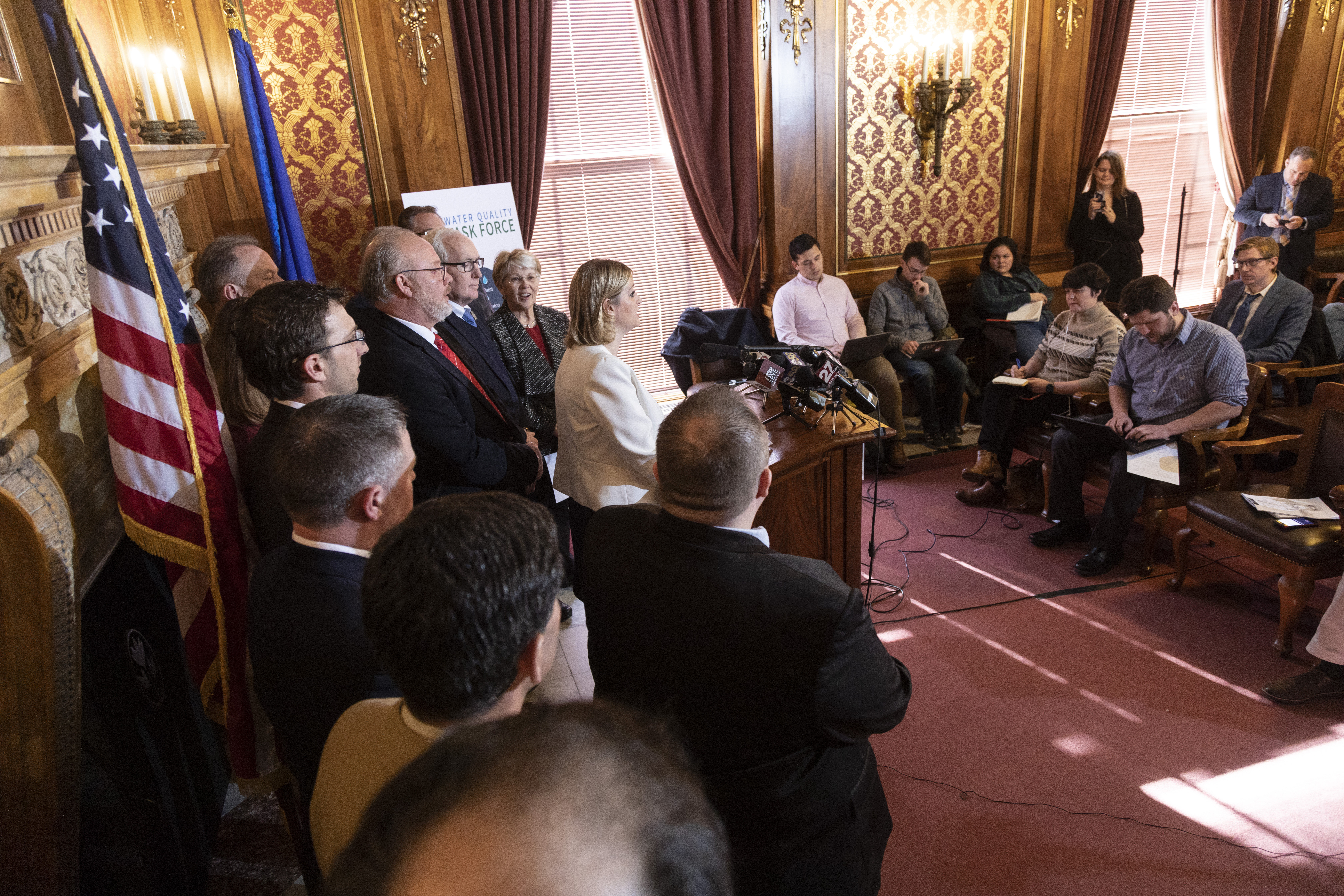
I'm proud to say that all ten bipartisan Water Quality Task Force bills passed unanimously through the State Assembly.
I also introduced the Raising the Bar for Clean Water legislative package with some of my colleagues to restore protections for our state’s water resources and reinvest in scientists and water quality initiatives. Finally, I introduced the brand new, bipartisan Clean Water Fund for Our Future to ensure that we have a sustainable funding source for clean water initiatives.
While the Assembly passed the ten-bill bipartisan package unanimously, the State Senate has not yet taken a vote on these bills. If you are pleased with the progress the Assembly has made and would like these bills to become law, I encourage you to contact your state senator to ask for a vote on the Senate floor during their extraordinary session. This work is too important to leave until next year.
In early March, I was proud to receive Wisconsin Land + Water's 2020 Friend of Conservation Award

Photo (above): Rep. Shankland accepts WI Land + Water's 2020 Friend of Conservation Award at their annual conference.
Protecting Roadside Responders (AB 746)
I was pleased to introduce Assembly Bill 746, bipartisan legislation to protect emergency and roadside responders from harm when responding to incidents on our roadways through education, prevention, and enforcement measures.
I worked with a broad coalition of stakeholders and allied organizations to bring this bill forward at the request of first responders from across Wisconsin, especially Assistant Chief Brian Swan and Chief Victor Voss of the Amherst Fire District, who initiated this legislative effort.
As I worked on this legislation, I heard from first responders from across the state who said they would much rather run into a burning building than handle an accident on the side of the road. Their families told us they worry most when their loved ones have to respond to a highway incident.
Emergency medical responders from across the state came to the bill's public hearing to voice their support, and their informative and moving testimony helped ensure the bill passed unanimously through the Assembly Committee on Criminal Justice and Public Safety. Unfortunately, the legislature adjourned for the session without moving this bill through the Assembly and Senate.
I am so grateful to everyone who made it down to the Capitol to share their personal stories and support for the bill with the members of the committee, and will keep doing everything I can to advocate for these changes to protect roadside responders.
Photo (below): Rep. Shankland stands with emergency responders and family members from across Wisconsin who came to the public hearing to support AB 746
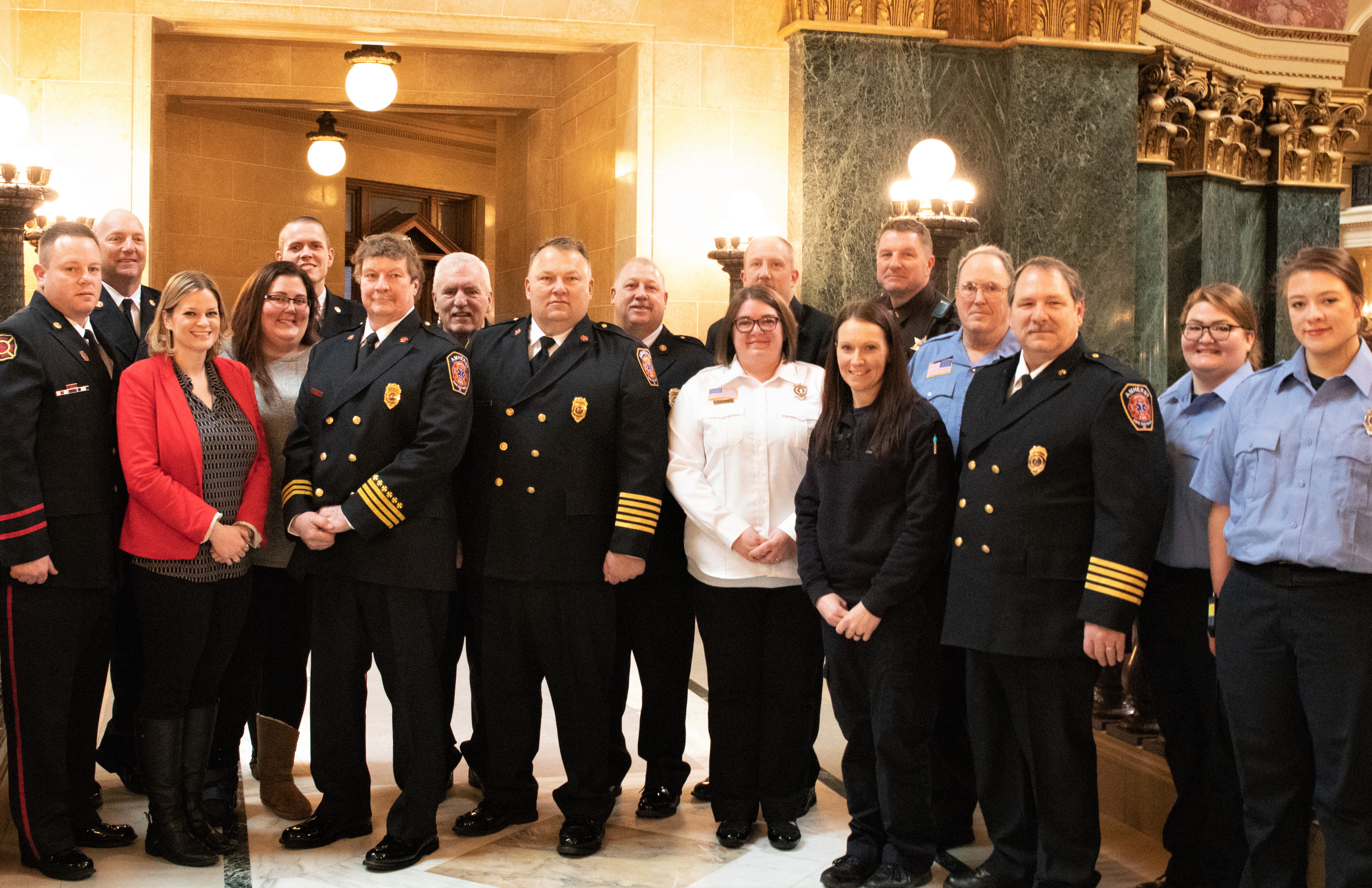
|